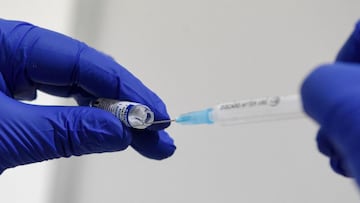Will a third vaccine dose for covid-19 be needed in the future?
Billions around the world are still to receive a single dose of a covid-19 vaccine, but the question of whether booster doses will be needed to combat emerging variants is already circulating.


While in the United States, the rate of vaccinations has increased since the beginning of the year, the lack of doses in other parts of the world has experts worried.
How do virus variants and mutations impact our need for another vaccine?
Every time the covid-19 coronavirus infects an individual and begins to multiply in the infected cells some of the copies of the virus created will contain mutations in its genetic code. While most mutations are benign in terms of the danger to humans, or are even detrimental to that individual virus particle, some mutations have the made virus more resistant to the vaccines we currently have.
Studies have shown that although most vaccines, including Pfizer, Moderna, AstraZeneca, and Jonhson and Johnsona, can protect against the most common variants, they are not as effective as the original strain the vaccines were designed to give immunity to. Giving the virus fewer chances to mutate is critical to in allowing the vaccines currently available a better to protect us. Effectively, that means reducing the number of infections – the less chance the virus has to reproduce the less chance of producing mutations.
How does “vaccine nationalism” contribute to our possible need for another vaccine?
An article recently published in the New England Journal of Medicine outlines the threat that low vaccination rates in “less developed countries” may have on reaching global herd immunity. The authors warn that with the current vaccination rate of “roughly 6.7 million doses per day”, herd immunity at the global level could be delayed 4.6 years. Additionally, experts are projecting that it is unlikely that 80% of residents in “low-resource areas” receive a dose this year.
While “vaccine nationalism” is partly to blame, the experts also say that inequities in distribution “reveal a fundamentally flawed view of global health, and our global economy more broadly, in which vaccines and essential medications are treated as a market commodity rather than as a public good.”
The article ends by arguing that creating equal access to vaccines “is not only a moral obligation” but that “it also serves our self-interest by protecting our security, health, and economy.”
Will people who have been vaccinated require a booster dose?
As more variants of covid-19 appear, the need for people to receive a booster dose of vaccine, some time after the initial doses were given, rises. There will also be a requirement for vaccine manufacturers to tweak their vaccines to take account of the new variants.
Related stories
In an interview on 15 April, with CNBC’s Bertha Coombs, Pfizer CEO, Albert Bourla said: “A likely scenario is that there will be likely a need for a third dose, somewhere between six and 12 months and then from there, there will be an annual revaccination, but all of that needs to be confirmed. And again, the variants will play a key role”.
These statements, as well as evidence provided by international health experts, highlight the urgent need to reach herd immunity quickly and how issues relating to equitable distribution of vaccines may stunt our ability to bring an end to the pandemic.
- AstraZeneca
- Pfizer
- Johnson & Johnson
- CNBC
- Ciencia
- Coronavirus Covid-19
- Industria farmacéutica
- Vacunas
- Pandemia
- Coronavirus
- Farmacia
- Enfermedades infecciosas
- Virología
- Epidemia
- Vacunación
- Canales televisión
- Enfermedades
- Microbiología
- Medicina preventiva
- Medicina
- Empresas
- Televisión
- Economía
- Medios comunicación
- Biología
- Industry
- Communication
- Life sciences

